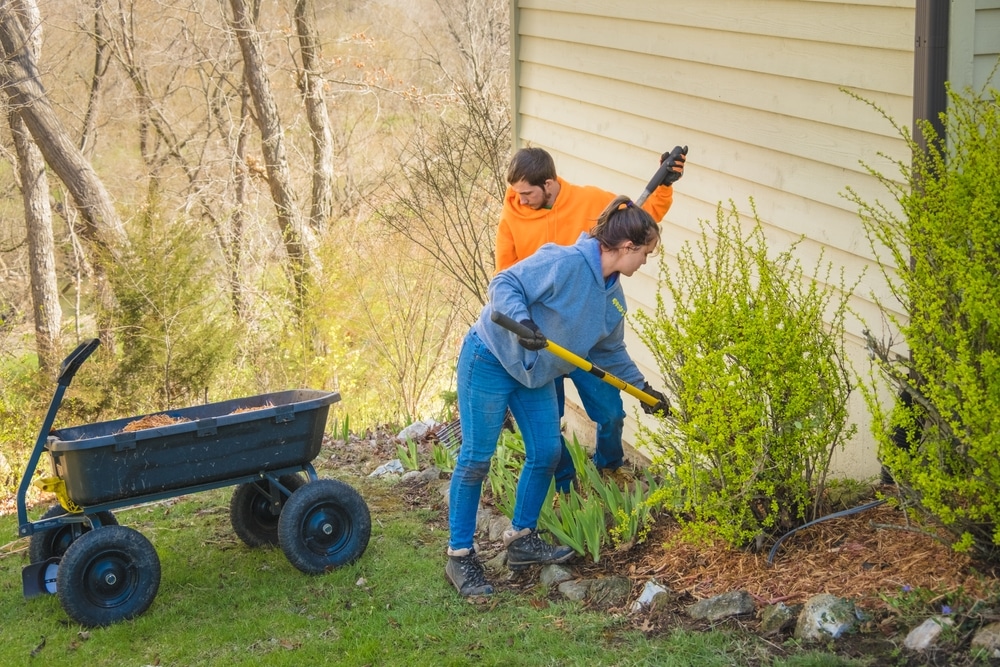Basement flooding is something no one wants to deal with on their property at any time, and there are a few different systems that may play a role in helping prevent this issue. One example here that sometimes doesn’t get enough attention from homeowners: Their landscape, which can play a huge part in either protecting the basement from flooding or increasing the risk of this happening.
At BioGrass Sod Farms, we offer numerous products to assist with your full range of landscaping needs, from topsoil and mulch to bark products, hardscape solutions and much more. We assist clients with any kind of need they may have, and have helped many customers with landscaping additions or updates that help prevent any risks of flooding in their basement throughout the year. Here are some top ways of preparing your landscape to be an asset to you in this area rather than a hindrance.
Yard Grading
One of the simplest and most important steps in protecting your basement from flooding is making sure that the yard around your house has a good grading toward the street. This should be done after any kind of installation on your property, such as fences or walling, to ensure it’s still working properly. The soil needs to be graded an inch for every foot away from the house to direct water away from the walls.
As you’re doing this, a key tool to have on-hand is a leveling tool to ensure the grade is as it should be. It’s also important to check your downspouts and gutters, making sure they’re directing water away from the foundation of your property.
Use of Mulch
Another key concept of preventing basement flooding involves ensuring that water doesn’t have easy access to your basement walls. This is where the use of mulch comes in, as it helps absorb water and can keep your home from being flooded this way.
Remember to not place too much mulch around your house though, as this could potentially cause more issues if not used properly. The soil should be kept slightly moist but never soggy or overly wet.
Creating Proper Drainage
Another big factor to consider when it comes to protecting your home from potential flooding is creating proper drainage for any water that does make its way near the property. This involves moving excess rainwater away from the house, and building a more natural form of drainage that can handle any kind of overflow in this area.
These solutions may involve the installation of a French drain, dry creek bed or swale—all of which can help move any extra water away from your home to an area where it won’t cause issues with flooding. In other cases, you may just have to do a little extra work on your gutter and downspout system, which can be a simple and cost effective way to keep your basement protected from flooding.
Rain Garden Planting
Some homeowners choose to take the extra step of installing a rain garden near their house. This is a type of landscaping that’s specifically designed to capture and use excess water, which would otherwise be causing flooding issues for the basement.
Rain gardens are typically planted with native plants, such as ferns or grasses, and don’t require much in the way of maintenance. They may even help promote wildlife in the area and provide a beautiful addition to your property.
Rain Barrels
In other cases, you may want to consider the installation of rain barrels, which are also designed to help capture excess stormwater and direct it away from your home. The barrels can be placed wherever you need them, such as along a fence line or near downspouts.
When picking out any kind of rain barrel for your property, make sure that it has an overflow valve to ensure that it can handle any kind of water overflow and direct this excess in the right direction.
Grass Planting
Some don’t naturally think of grass planting as a way of reducing basement flooding risks, but in this area it’s important to think about root networks and how they can help divert water. Many forms of grass have root systems that will help absorb and channel water out of the way, which can be a great addition to your landscape.
At BioGrass Sod Farms, we have a wide selection of sod and grass varieties that are perfect for this job, and our knowledgeable staff will be able to help you select the best variety for your property’s needs.
By taking these steps, you’re much more likely to be able to protect your home from basement flooding. Contact us today if you’re interested in learning more about how to keep your basement dry and learn about our selection of grass for the job.
